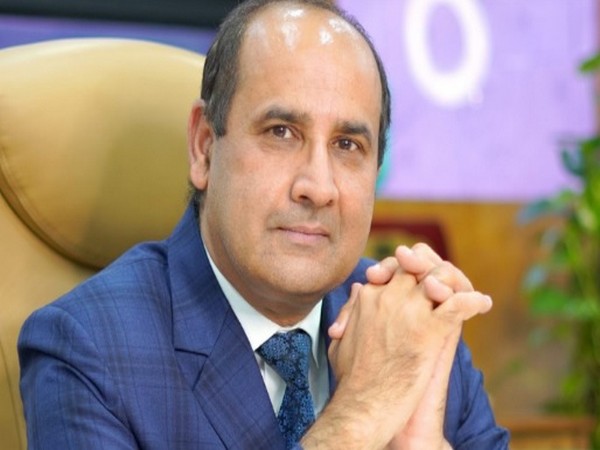India’s ongoing transition to green energy key to sustainable growth: National Economic Forum

NEW DELHI: The National Economic Forum (NEF), a policy research institute and think tank, focussing on governance for growth and knowledge-based economy, in its ambition to see India a $30 trillion economy by 2047 in line with Centre's vision of Viksit Bharat (Developed India). In an interaction with The PageOneAsia, Amitabh Banerjee, Director of Delhi-based NEF talks about the amalgamation of transformative policy architecture, ecological stewardship, urban governance and digital transformation in order to achieve national ambition of developed India and global leadership.
Edited Excerpts:
What is the vision of the National Economic Forum for Viksit Bharat 2047?
NEF envisions Viksit Bharat 2047 as a luminous embodiment of self-reliant modernity, inclusive prosperity, and ecological equilibrium. Anchored in its foundational credo - ‘an India that learns from the world and a world that can learn from India’, NEF aspires to sculpt a nation where robust economic growth is not merely an end in itself but a means to elevate the collective national consciousness. With a triadic approach centred on People, Places, and Programs, the Forum endeavours to conceptualise transformative policy architectures that yield equitable outcomes, while customising implementation frameworks to the variegated strengths and aspirations of India’s federal mosaic. In consonance with the national aspiration of transforming India into a $30 trillion economy by 2047, NEF champions a suite of imperatives. Through multidimensional endeavours, NEF seeks to illuminate a visionary path towards a truly developed India by 2047; one that is resilient, resplendent, and resolutely future-ready.
What are the focus areas of NEF and how are these contributing to the nation's progress?
NEF, ensconced in the intellectual crucible of New Delhi, orients its endeavours around six cardinal pillars that synergistically advance India’s trajectory toward inclusive prosperity and global prominence. These domains, namely, technomics, governance for growth, knowledge economy, law and economy, sustainable horizons, and geostrategic frontiers, serve as both compass and catalyst in NEF’s mission to script the nation’s economic renaissance. Together, these focus areas comprise a multidimensional framework that not only dissects contemporary challenges but also architectonically contributes to India’s metamorphosis into a resilient, equitable, and globally consequential economy.
How will NEF help India reach the goal of becoming the third-largest economy?
According to the IMF’s World Economic Outlook, India’s nominal GDP for the current year is projected to reach approximately $4.27 trillion. The country is currently positioned as the world’s fourth-largest economy, just behind Germany. The coveted milestone of emerging as the third-largest economy is thus not a distant aspiration, but a foreseeable reality well within our grasp. NEF positions itself both as a lighthouse and a compass in India’s economic voyage, illuminating pathways and guiding the nation’s ascent to the coveted pedestal of the world’s third-largest economy. Through rigorous research, policy acumen, and intellectual cross-pollination, NEF engages with the structural intricacies that undergird India’s economic ambitions. At the vanguard of technological thought leadership, NEF’s explorations into artificial intelligence, semiconductors, ntech, and digital public infrastructure form the substratum for a new-age, knowledge-driven economy. Its advocacy for an equitable digital transformation ensures that innovation is not merely an elite enterprise, but a vehicle of empowerment across India’s socio-economic spectrum. Moreover, NEF integrates environmental sustainability into the heart of its economic thinking. From clean energy transitions and circular economy models to the low-carbon imperative, NEF’s work reinforces India’s commitment to achieving net-zero emissions by 2070 without arresting its economic momentum. Further, it forays into strategic sectors such as critical minerals, maritime policy, and outer space economics and India the strategic foresight to navigate geopolitical uncertainties and resource constraints. In essence, NEF is not merely a think tank, it is a crucible of India’s future economic architecture, forging ideas that are as ambitious as they are actionable, and ensuring that the country's rise is not just inevitable, but intelligently engineered.
How can the states/Union Territories help India achieve the $5 trillion target?
The quest for a $5 trillion economy (by 2025) is not merely a macroeconomic milestone but a federated aspiration, a goal in which India’s States and UTs must not be passive recipients but active architects of national prosperity. NEF views sub national entities as pillars of innovation, growth, and governance experimentation, whose performance cumulatively determines the nation's economic destiny. To that end, NEF advocates for a paradigm wherein States and UTs assume catalytic roles across multiple vectors: by crafting investment-friendly ecosystems, expediting administrative reforms, and nurturing sectoral excellence aligned with their comparative advantages. Be it green industrial corridors in Gujarat, digital service delivery in Kerala, bamboo-based economies in the Northeast, or tourism-led development in J&K, each region must transform into a fulcrum of economic dynamism. In essence, the journey to a $5 trillion economy is not a sprint orchestrated from Delhi, but a polyphonic symphony, requiring the harmonised energies of India’s diverse regions, guided by the sagacity of collaborative federalism and fuelled by grassroots ambition.
Do you think this vision of becoming a US$5 trillion economy is realistic?
The aspiration of a $5 trillion economy has transcended the realm of visionary ambition and now stands at the cusp of imminent fruition. To debate its realism at this juncture is to belatedly question the plausibility of a race we are already on the verge of completing. The finish line is within sight; the discourse must now shift from possibility to preparedness for what lies beyond. To answer the question; NEF recognises the ambition of India's aspiration to become a $5 trillion economy. However, NEF maintains a cautious stance, acknowledging both the potential and the challenges inherent in this goal. India's nominal GDP shall reach approximately $4.27 trillion by the end of this year, indicating significant growth from previous years. Achieving the $5 trillion target would necessitate a sustained annual growth rate of around 6.5-7%, a trajectory that remains within the realm of possibility given the nation's demographic advantages, ongoing reforms, and strategic policy initiatives. However, NEF reiterates that this growth must be inclusive and sustainable. The path to a $5 trillion economy requires addressing structural challenges such as infrastructure deficit, unemployment, and economic disparities. Moreover, external factors, including global economic conditions and geopolitical dynamics, could influence India's economic trajectory. With concerted efforts, strategic reforms, and inclusive policies, India can make significant strides toward realising its economic aspirations for this year.
Which sectors should India target in the quest to become the third-largest economy worldwide?
India’s ambition to become the world’s third-largest economy by 2028 is not only feasible but a target that requires focused effort across several strategic sectors. According to the IMF’s World Economic Outlook, India's nominal GDP for the current year is projected to reach approximately $4.27 trillion; currently the world’s fourth-largest economy, trailing behind Germany. Achieving the $5 trillion milestone, and ultimately securing the third-largest position, necessitates robust growth across key sectors. First, manufacturing and industrialisation must be a cornerstone. India's manufacturing sector, projected to contribute above the current 17% of the GDP by the end of this year, is poised for significant expansion with initiatives like the Production-Linked Incentive (PLI) scheme, which encourages domestic production and attracts foreign investment. Second, India’s digital economy presents immense potential, with the sector expected to contribute up to 20% of national income by 2029-30. By continuing to invest in 5G networks, digital infrastructure, and technology-driven innovation, India is primed to drive productivity, competitiveness, and global exports.
Another critical area is renewable energy, where India’s ongoing transition to green energy is vital for sustainable growth. By the end of the first three months of this year, India’s renewable energy capacity reached 220 GW, largely driven by solar energy projects, helping mitigate climate challenges while generating new economic opportunities. The government’s continued investment in infrastructure, including transportation and rural connectivity, is equally essential. With a Rs. 11.21 lakh crore allocation for infrastructure in 2025-26, India aims to strengthen its economic backbone, enhancing both productivity and regional economic activities. Also, human capital and education must evolve in tandem. India is investing in skill development and educational reforms, including a significant boost in medical education with 10,000 new seats expected to be added in 2025.
Is India taking the right steps to meet 2070 net-zero targets?
India's aspiration to achieve net-zero emissions by 2070 is both ambitious and imperative. The nation has made commendable strides in expanding its RE capacity, reaching 220 GW by early 2025, with solar energy accounting for nearly half of this capacity. This progress aligns with India's commitment to attain 500 GW of non-fossil fuel-based energy capacity by 2030. However, challenges persist. Coal still remains the dominant source of electricity. This reliance on fossil fuels highlights the need for a more aggressive transition strategy. Moreover, achieving the net-zero target will require substantial investments, estimated to be over $10 trillion by 2070. To navigate this complex landscape, India must bolster its policy frameworks, enhance infrastructure for renewable energy. While the path to net-zero is fraught with challenges, India's proactive measures and commitment to sustainable development indicate a determined pursuit of its 2070 goal.
What is the role of the National Economic Forum in shaping country's policy discussions?
In an era where economic paradigms are continually evolving, NEF's role as a thought leader and policy influencer is indispensable in steering India towards sustainable and inclusive growth.
What are the key economic trends you believe India should capitalize on in the next five years?
India’s unprecedented economic potential; poised to capitalise on a confluence of transformative trends that could elevate it firmly into the top tier of global economies. With the GDP growth forecast at around 6.2-6.3%, the Indian economy is demonstrating remarkable resilience amidst global headwinds. A key trend that stands out is the meteoric rise of the digital economy, projected to touch around $1 trillion by 2028, fuelled by a surge in tech innovation, AI integration, and deepening digital penetration across urban and rural India alike. Simultaneously, India's renewable energy sector is undergoing a green renaissance, with installed capacity crossing 220 GW in early 2025. The country's steadfast commitment to achieving 500 GW of non-fossil fuel-based capacity by 2030 reflects a deliberate pivot toward sustainable growth.
With economic uncertainties worldwide, how do you ensure that forums like yours remain relevant and impactful?
In a world increasingly beset by economic policies ranging from geopolitical upheavals to supply chain dislocations and climate-induced disruptions, relevance is not merely maintained, but meticulously engineered. At NEF, we achieve this through a triadic methodology rooted in anticipatory research, adaptive policy making, and agile stakeholder engagement. As India strides toward becoming the world’s third-largest economy, NEF’s role is to transmute uncertainty into opportunity.










